Part 15: XV. Laurence I, Anselm II 1453-1475 A.D.
It is the Year of Our Lord 1453.
Europe is awakening from the dark slumber of the Middle Ages.
In the east the Crusader Kingdom of Jerusalem rules the Middle East. Over the past three centuries Jerusalem has carved a Kingdom out of the hostile heart of the Islamic world. Jerusalem defended its conquests, defeated the Mongol invasion, and eclipsed the crescent of Islam with Cross of Christ. But the Kingdom still lingers in feudal disarray, with large portions of its territory under the control of local lords. The strongest of these are the Duchy of Arabia, the Duchy of Basra, the Duchy of Hormuz, and the Duchy of Persia.
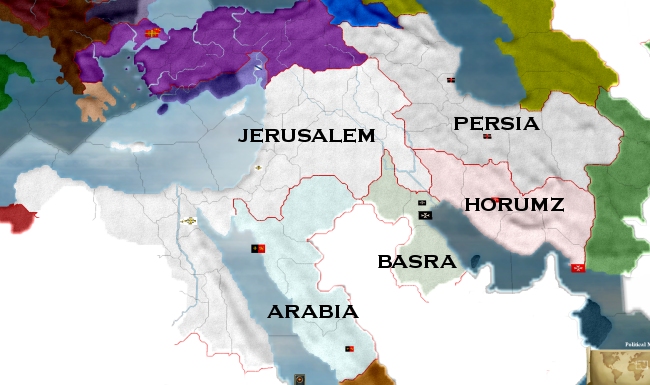
North of Jerusalem the once massive Byzantine Empire has crumbled in civil war. The vast Russian steppes and endless forests have broken away from their Greek overlords in Constantinople and founded their own empires and Kingdoms. But the Byzantine Emperor yet plots to retake his lost lands…
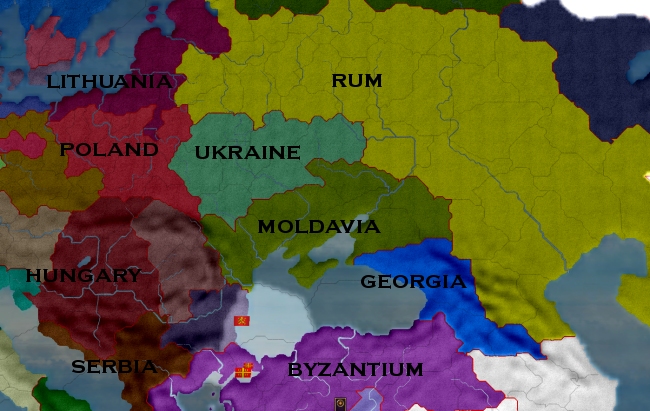
The news from western Europe is of fractured Kingdoms and constant warfare. Here in the west, new ways of thinking are being born amidst the violence. Ways of thinking that will open up new worlds.
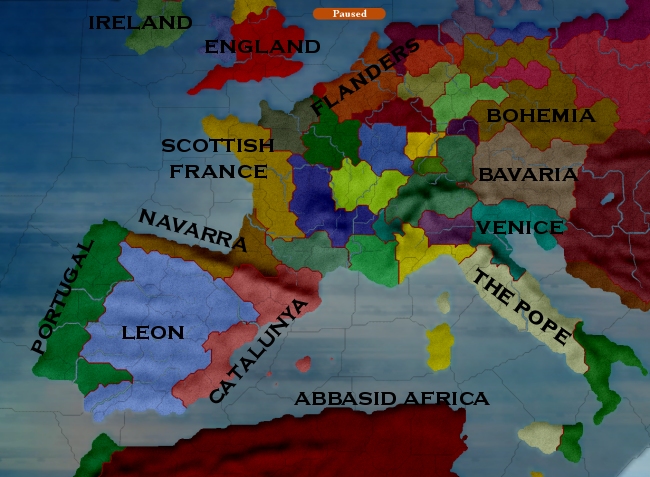
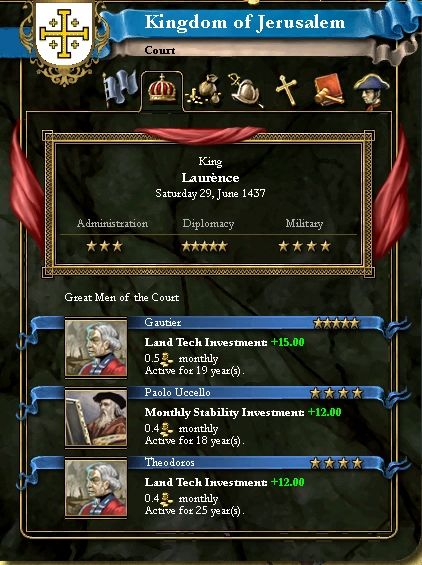
King Laurence is forty years old in 1453. The converter was very generous with the stats of Kings and their advisors. It is not likely we'll see this many stars on the screen again during the entire game. We can have three Great Men at any time and each month they'll add the stated amount to their specialized investment.
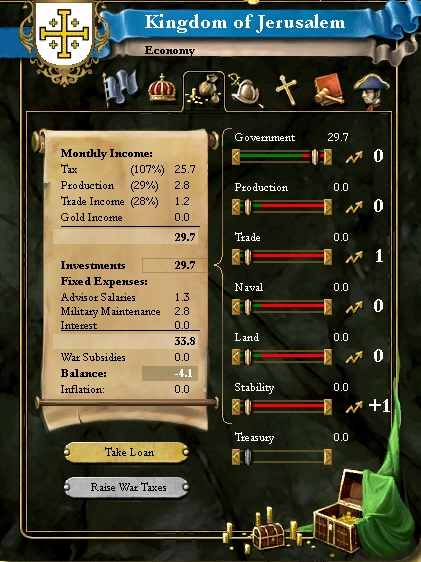
This is the economy of the Kingdom in 1453. The vast majority of our income comes from taxes and very little from production and trade. We can divide our monthly income up anyway we please, and we begin by focusing on improving our government technology. You'll notice we're losing about four gold a month. This isn't too bad, as our yearly income is slightly over a hundred, so as long as we don't spend too much we won't go bankrupt. We could up the treasury slider to offset this loss or even gain money every month, but the more we do that the more inflation we'll gain, and that can cause long term damage to our economy.
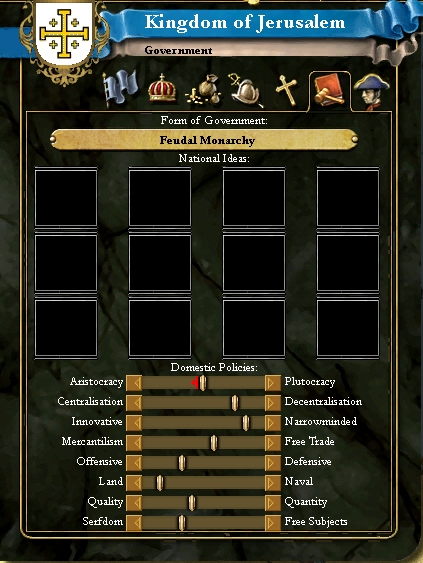
Theses are the national policies of the Kingdom. One slider may be moved one click once every sixteen years. More advanced governments can move the slider more often. It also costs one stability to move the slider. There are many trade offs for each slider. We move the Centralization slider one to the left. This helps bring the Kingdom more under the central authority of government in Jerusalem rather then local lords.
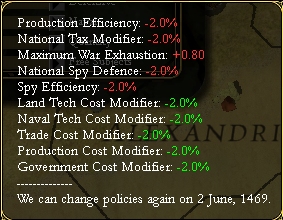
As we're to the right of center right now we get bonuses to tech speed and penalties to all those things in red. Moving the slider decreases the bonuses and penalties. Once we pass the middle, many years from now, we'll get a penalty to tech speed and boost to the other factors.
On the first of June in 1453, the Byzantine Empire attacks the small nation of Bulgaria, one of their former principalities. The Emperor calls on King Laurence and Jerusalem to assist him and the King agrees.
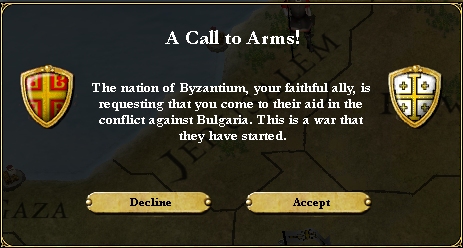
Why? Prestige is important in EUIII. It ranges from -100 to +100 and affects several dozen things to greater and lesser degrees. Refusing to come to the aid of an ally drops your prestige 25 points, which is a fair bit considering Jerusalem only has 28 at the moment.
Fortunately, there is no real need to attack, Bulgaria. Byzantium seems satisfied with merely moral support. King Laurence does, however, use the war as an excuse to levy extra war taxes on the nation. This increases war exhaustion slightly, but as there isn't going to be a real war it doesn't matter too much. It also raises tax revenues for the next year.
By the spring of 1454, Byzantium annexes Bulgaria's coastal province and signs a peace treaty.
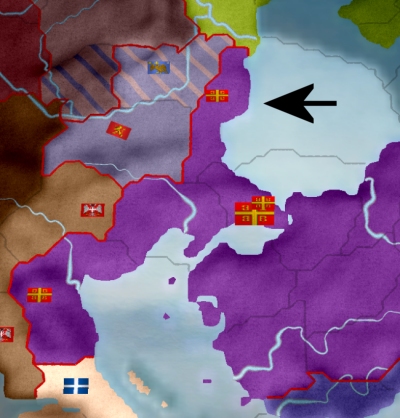
The Kingdom of Jerusalem has a decent sized navy of thirty galleys. Unfortunately, all these galleys were built in the Red Sea. There is no Suez canal yet or route around Africa, so the Kingdom has no way of projecting naval power in the Mediterranean. Wondering which of his predecessors made such a blunder, King Laurence orders work to begin on new galleys in Egypt's Mediterranean ports.
That summer our investment in government technology pays off and we reach level 1. This entitles us to pick a new national idea. Every country in EUIII has twelve national idea slots that open up over the course of the game. A national idea is a unique special power that helps distinguish nations from one another.
These are the national ideas available to pick from.
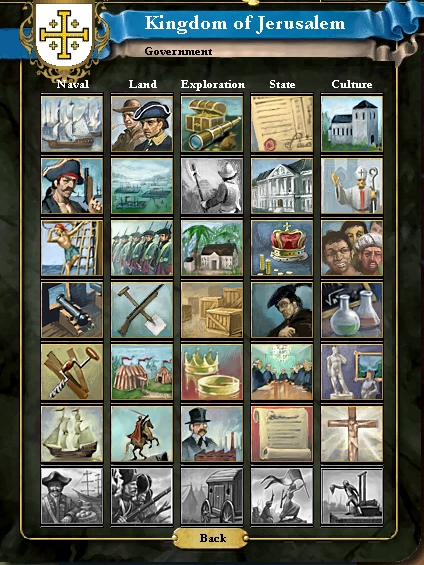
The ideas at the bottom that are grayed out are special late game ideas that were added for the Napoleonic period. The grayed out idea in the middle is called Quest for the New World. I restricted this idea to level 3 naval tech so that no nation could pick it as their first idea. Otherwise there are thriving colonies in North America by 1470. This will delay the AI colonization rush a little bit.
The Kingdom chooses to take the Deus Vult national idea, which allows them to declare war on any nation of another religion without a stability hit. This is good because stability is more important in EUIII then it was in Crusader Kings. Stability again ranges from -3 to +3 and affects your chance of success for almost everything, your tax income, how rebellious your provinces are, and the random events you get.
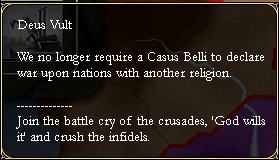
In 1456 the cultural differences in the population of Nubia cause a large revolt. 6,000 locals rise up, arm themselves, and siege the local garrison.
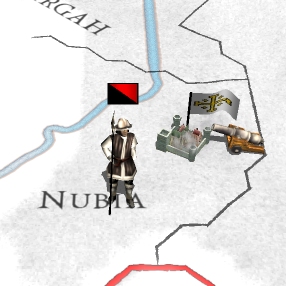
Before long the fort falls and the rebels take control of Nubia. King Laurence assembles a relief army and sends it south to defeat the rebellion.
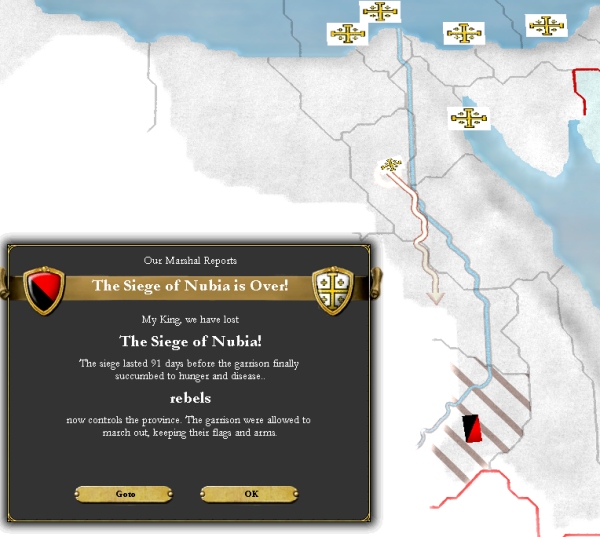
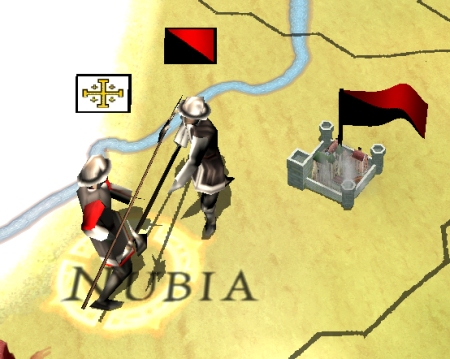
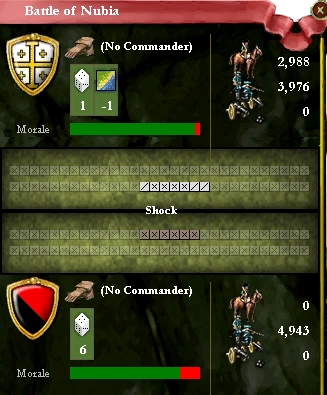
The rebels are defeated, although the battle was quite close, and after a few weeks of rest the Kingdom army assaults the tiny Nubian garrison holding the fort and by October the province is safely reconquered.
Feeling cocky after their war with Bulgaria, the Byzantine Empire attacks the splinter state of Greece which became independent during the Byzantine Time of Troubles. Again the Emperor calls on help from Jerusalem and Jerusalem answers the call. What King Laurence didn't realize was that the Greek ally of Sicily also joined the war.
Within weeks thousands of Sicilian troops land on Crete and march across the island where they isolate Jerusalem's local fortress. King Laurence sends his new navy out to drive the Sicilian ships from Crete's shores.
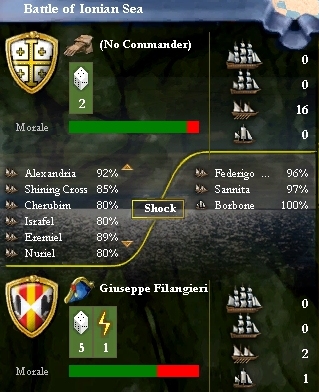
Unfortunately, although the Kingdom fleet defeats Sicily, King Laurence does not have enough transport vessels to carry enough troops to relieve Crete. He quickly orders a crash construction program along the Palestinian and Egyptian coasts, but it will take at least six months to build and gather the transports. In the mean time, Jerusalem's galleys patrol the waters of both Crete and Greece, preventing Sicily from reinforcing their invasion force. Meanwhile, Byzantium marches south into Greece while their allies, the Principality of Adana in southern Anatolia conquers the Aegean isles.
The garrison on Crete holds out long enough that King Laurence manages to assemble a transport fleet and send the Army of Egypt to the rescue of the beleaguered defenders.
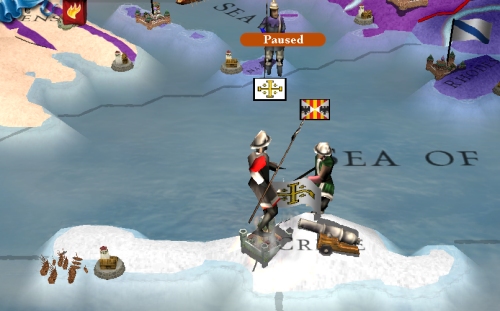
The Sicilian invaders are defeated and the army moves to southern Greece to assist in Byzantium's final conquest. By the summer of 1458 the war is over. Byzantium demands that the local Greeks reswear fealty to the Empire and become vassals. There are no material rewards for Jerusalem, not even any war indemnities.
Over the next few years King Laurence tries to build up the standing army of the Kingdom. The time of local vassals being called up for a season or a campaign has ended. The Kingdom must strike a fine balance between having a large enough army to deter their aggressive neighbors while still not bankrupting themselves. What drives King Laurence on is reports that the Orthodox Abbasid Empire in the western half of North Africa have over 12,000 troops stationed on their border with the Kingdom, far more then Jerusalem's measly 3,000 defenders. Relief troops are raised and pushed west in order to strengthen the African border and deter and Abbasid ambitions on Egypt.
The Byzantine Emperor still hungers for blood. The local Balkan kingdoms have banded together for mutual defense, but that does not deter Constantinople. In March of 1462 the Byzantines declare war on an alliance of Wallachia, Bulgaria, and Serbia. This time, however, Jerusalem declines to get drawn into another war that does not involve them. Fortunately their prestige had built to 65 over the last few years and only drops to 40.
It's a hard decision to make and it means that relations with Byzantium are bound to slowly decay, especially as they are of a different religion. But King Laurence feels the Kingdom must focus on its own challenges and internal problems rather then continuing to be the menacing muscle behind Byzantine ambitions.
God it seems supports King Laurence.
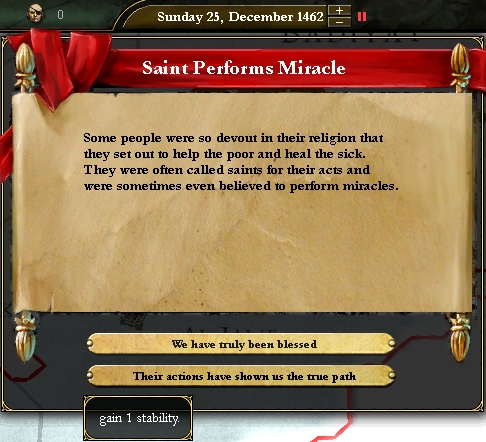
The stability of the Kingdom goes up 1 to reach +2.
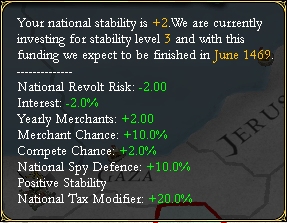
Considering that stability can take many years to build up this is quite a nice bonus for the Kingdom.
In 1463 King Laurence begins to focus on weakening the power of his vassals and trying to centralize power in the Kingdom. He has a 9 in his diplomatic skill, something we're not likely to see again for a long while, so it's best to try to use that skill before he dies. This consists of sending gifts to our vassals to boost our relations to near or at maximum levels. Then we have a chance of annexing them. This takes a lot of time, money, and rejections to succeed.
In 1464 Byzantium wins its war, taking Macedonia and Albania from the Serbians. News also comes that the King of Bohemia, a descendent of the same bloodline as King Laurence, has also become the dual King of Hungary. Hungary is not folded into Bohemia, but the two nations are now in a 'Personal Union' and share the same King. There is a small chance that Bohemia will inherit and annex Hungary, especially if they keep relations high between the two nations.
A random event show up, forcing us to choose between a free slider move towards offensive combat or defensive combat. King Laurence picks offense of course, because the soldiers of God take the battle to the enemy, they do not cower behind walls.
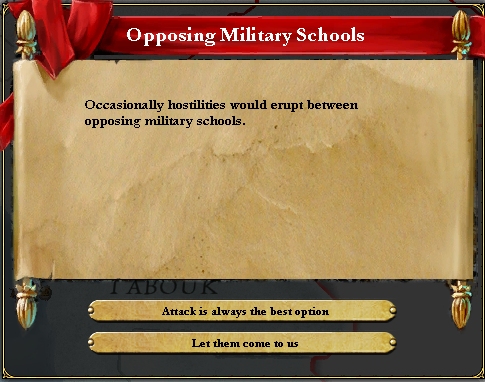
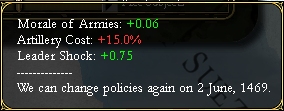
In January of 1465 a cardinal from Jerusalem becomes the next Pope, giving the King of Jerusalem unparalleled influence and access to the Pontiff!
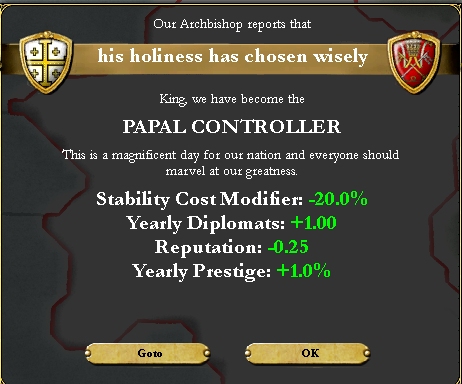
It is the last coup for King Laurence. Fifty years old, he dies quietly in his sleep in May of that year. He is laid to rest with his ancestors, stretching back to Baldwin IV. The last link to Crusader Kings is broken. His son, Anselm II, takes the throne.
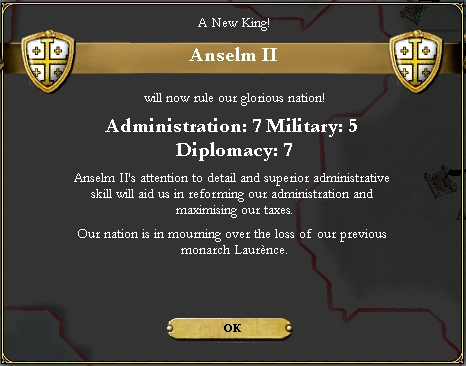
While it's true that King Anselm is not quite the amazing diplomat that his father was, he is still quite skilled. This is demonstrated clearly when, just days after his coronation, he wins concessions from the Duke of Arabia effectively ending any pretensions the Duchy had of independent rule.
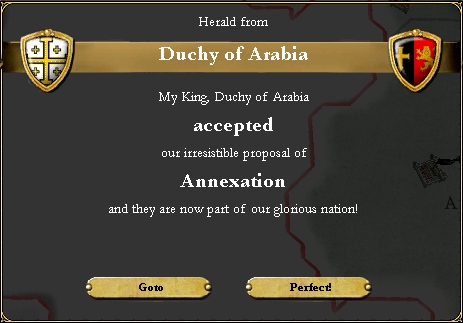
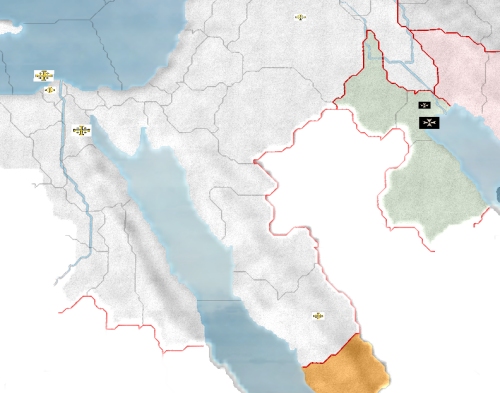
This diplomatic victory does tarnish the reputation of the Kingdom slightly. Some see it as a power grab, others as a threat. We gain several points of 'badboy'.
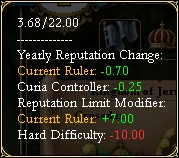
Badboy lowers your relations with other nations, makes it harder to trade, and has a few other negative effects. Furthermore that 22 is a break point. If you pass that your neighbors see you as a terrible threat. A sort of Nazi Germany of the Renaissance. Pass that point and the Badboy Wars begin, which means nearly everyone will attack you and try to bring you down until you cede enough land to go below the limit. Badboy also decays over time, based of your monarchs skill and your advisors.
We also get a nice bonus from owning Mecca, identical to the one we get from owning Jerusalem. Our preeminence amongst Catholic nations is almost guaranteed.
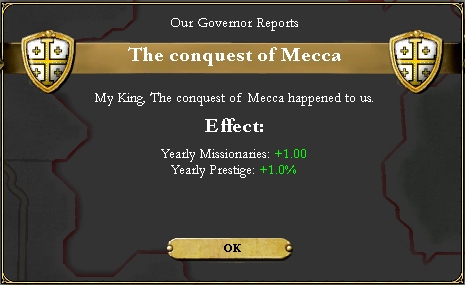
In 1466 there's another revolt in Nubia.
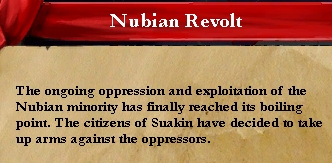
We convert King Anselm to a leader and send him south with a swarm of troops.

Combat consists of two alternating phases, fire and shock. Every unit has its own rating on those two numbers and leaders boost them. The little fireblast is Anselm's fire bonus, the lighting bolt is his shock bonus, the arrow is his maneuver bonus, and the cannon is his siege bonus. Units always perform better with a leader and if your country fights a lot or has the right national ideas you can build up military tradition which determines how good your leaders are. Kings with decent military skill are always good leaders, you just risk losing them in battle.
The Nubian rebels are crushed again.
That September news comes that the Kingdom of Venice (it's days as a republic ended long ago) inherited the throne of the Kingdom of Sicily. Furthermore the soldiers of Venice have conquered much of the territory of Genoa, giving them a large portion of the Italian peninsula.
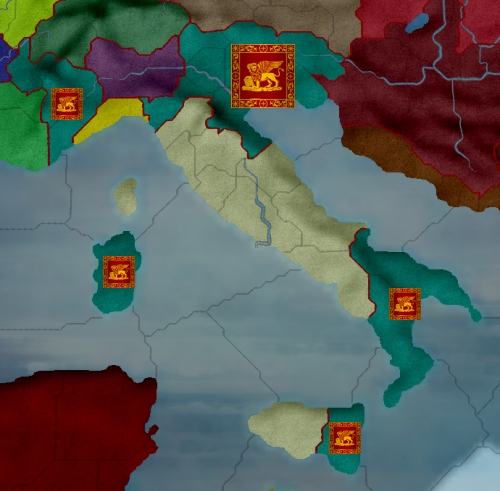
In 1468 the Kingdom's stability increases to its maximum, +3. Shortly thereafter, the first level of Production technology is discovered, allowing the Kingdom to purchase Workshops in its provinces. Workships cost around fifty gold to build and each one adds two extra gold to the taxes you collect at the end of the year. Individually they may not seem like much, but if you build twenty or thirty that's a sizable chunk of change every year.
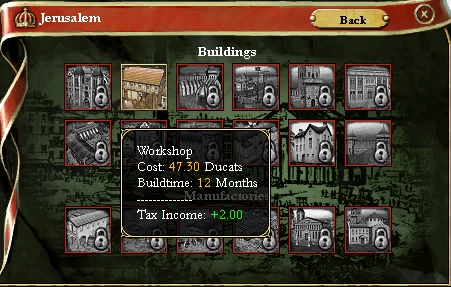
Anselm II only builds a few for the moment. While they're useful, most of the Kingdom's funds are going into pressuring his vassals. Attempts to annex Basra have already met with five failures, several more tries then it took to annex Arabia. Each attempt drops the relation between the two countries, requiring more gifts and more diplomats before another attempt can be made.
In 1470 one of the Great Men giving us land technology dies. Shortly thereafter we get a two star advisor giving a slight boost to stability. We hire him just to have him around in case our stability drops. There are no other decent Great Men in the general hiring pool.
Byzantium annexes Greece in 1471. Bit by bit they are rebuilding their ancient Empire.
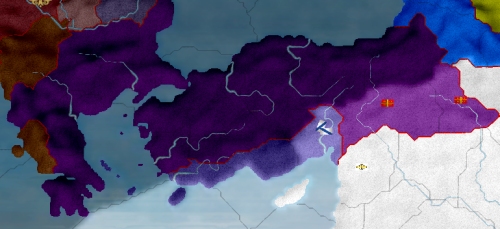
We also reach Land Technology level 2 in 1471. Every now and then you get the choice of new units to make up the core of your army. We get to choose between armies of Longbowmen or armies of Men at Arms.
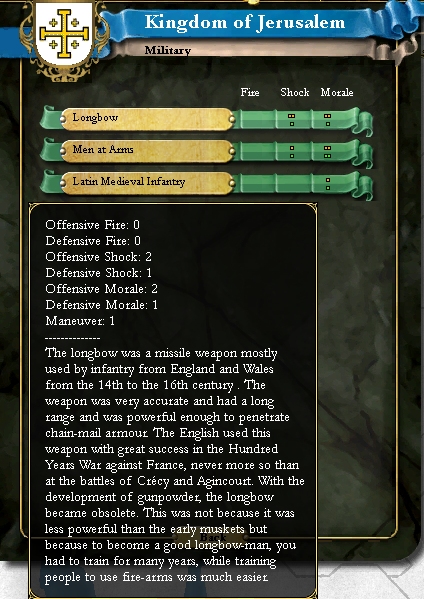
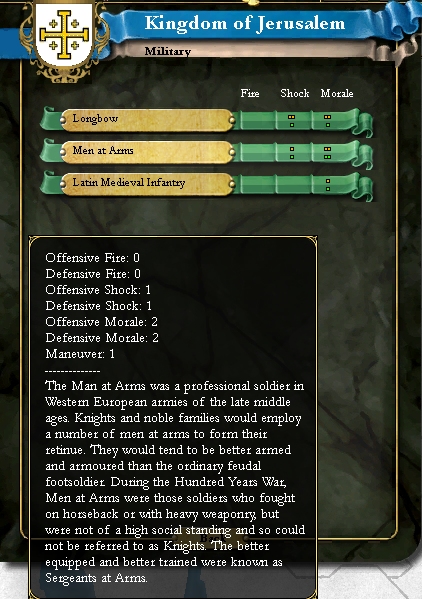
We decide to take Men at Arms because the bonus defensive morale is useful, especially as the AI gets morale boosts on Hard difficulty (which is what we're playing at.)
That November strange news comes. The Abbasids to the west have been having severe difficulties. Many of their provinces have fallen into rebellion. News comes that one of these provinces, Fez, has defected to the Portuguese. Then, one right after the other, the two Libyan provinces defect to the Kingdom of Jerusalem.
The chaos on the Kingdom's border is so great that King Anselm II is forced to step in and send Jerusalem's troops to restore order. The local population is jubilant to be freed from the Abbassids. Without effort or intent the border of the Kingdom has been moved several hundred miles westward.
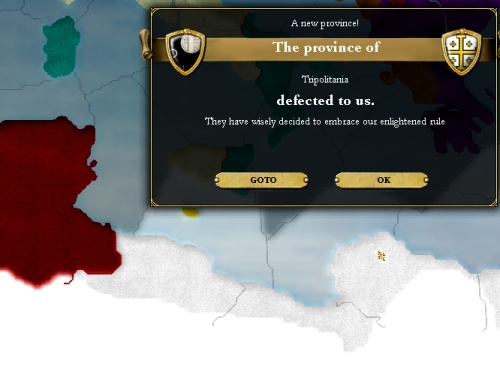
Meanwhile, the Duchy of Basra continues to reject Anselm's attempts to repeal their independence. Surprisingly however, he has better luck in southern Persia. The aging Duke of Hormuz, lacking a son of his own, agrees to marry his only daughter to Anselm's teenaged son. When the Duke of Hormuz dies that hot summer Hormuz becomes governed directly from Jerusalem.
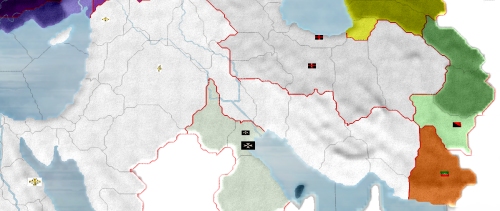
There is some concern though, about religious tensions. While northern Persia is largely Christian, much of the south remains Islamic. Yellow = Catholic, brown = Orthodox, green = muslim.
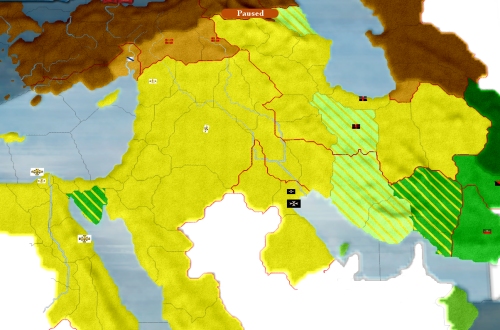
At least it seemed cultural divisions would not be too bad.
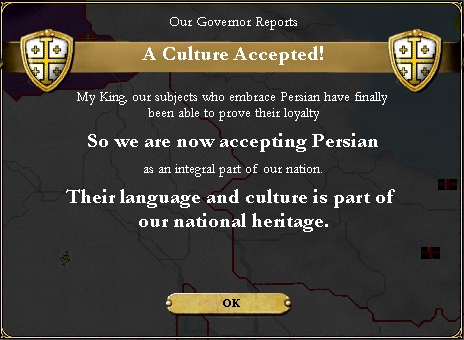
After his success in Hormuz, King Anselm II turned his attention south. For some years now, the Arabian emirate of Yemen had been harassing Jerusalem. Spies from the Muslim nation had instigated revolts and sent pirates against Christian trade. Anselm decided to teach them a lesson.
The orange to the south was the parts of Yemen that the Kingdom knew of. They were also said to control the interior of Arabia. Normally it's not possible to explore hidden land without the Quest for the New World idea and explorers/conquistors. However, if you're at war with a country who's land is still undiscovered you can explore those provinces only.
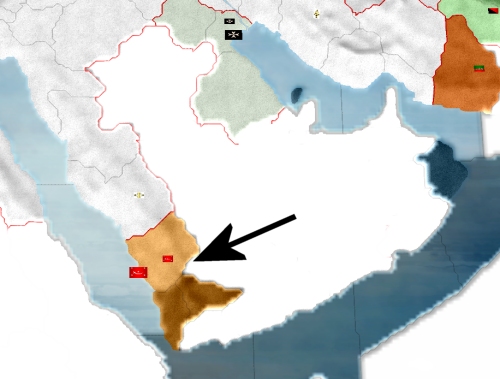
King Anselm II gathered his armies and recruited several leaders to aid him.
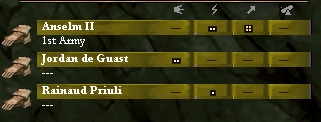
In June of 1473 he attacked. Yemen's ally, Oman, on the other side of Arabia also entered the war, but Anselm let his vassals in Basra and Persia deal with them.
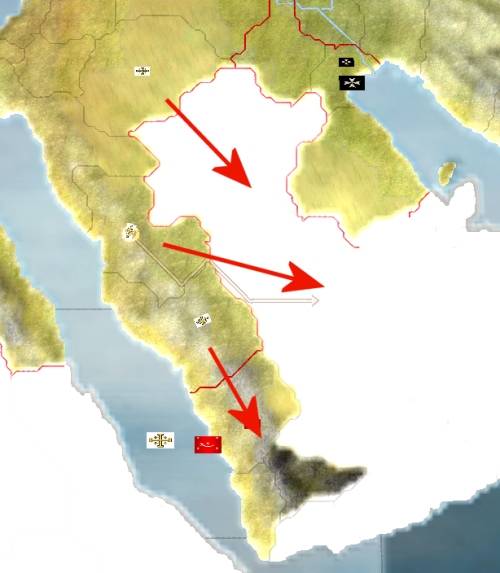
The initial stages of the war went very well, and Kingdom troops pressed into southern Arabia as well as the great unexplored deserts in the interior. Yemani troops launched a counterattack on Medina that drove back the central Kingdom army and reinforcements from Egypt were needed to contain the defeat.
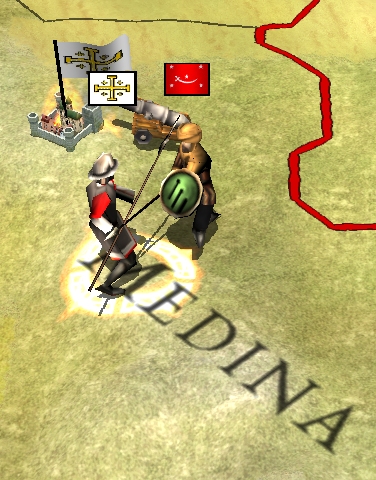
Once the Kingdom's superiority was obvious, Oman begged for a white peace, betraying their allies to spare themselves the fury of the advancing Crusaders. By late 1474 the war was wrapping up.
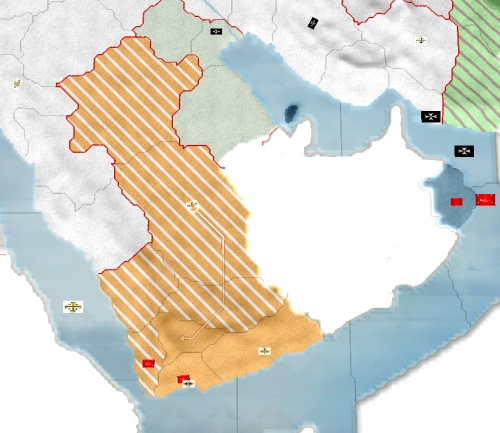
Jerusalem also had more to celebrate. That fall there was a fine royal wedding between one of Anselm's nephews and the daughter of a prominent Venetian noble.
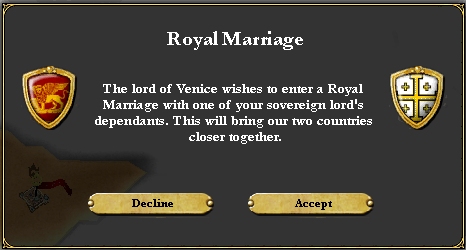
It was obvious that Yemen was badly defeated and several attempts to hash out a peace treaty were made. King Anselm's first few offers were rejected.
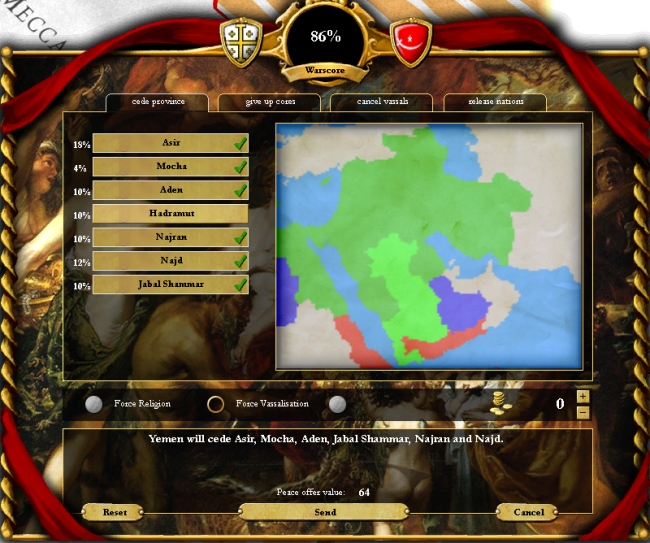
But eventually, the Yemani Sultan came around and surrendered to the Crusading army.
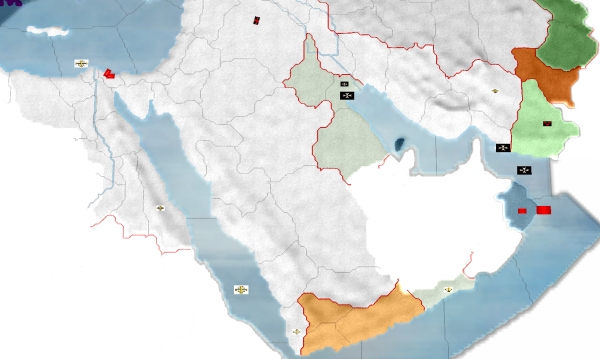
Hopefully now there would be peace in the south…